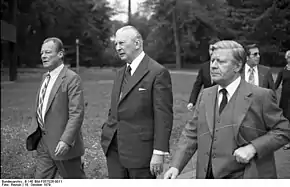Grand coalition (Germany)
In current German politics, grand coalition (German: Große Koalition) describes a governing coalition of the parties CDU/CSU and SPD,[1][2] since they have historically been the major parties in most state and federal elections since 1949. The meaning of the term may change due to the growth of some formerly minor parties in recent years.[3]
Weimar Republic (1919–1933)
In the Weimar Republic of 1919 to 1933, the term "grand coalition" was used for a coalition that included the Social Democratic Party, SPD, the Catholic Centre Party and the liberal parties Democratic Party, DDP and People's Party, DVP. Such a coalition was in power in 1923 and from 1928 until 1930, although the latter was a conglomerate of parties with somewhat conflicting interests that banded together as a safeguard for democracy against the radical political parties, the KPD and the NSDAP. In March 1930, the Great Coalition broke apart, with the resignation of the SPD over the contentious issue of increasing employees' national insurance contributions at a time when wages were falling.[4]
Federal Republic (1949–)

Federal level
In the post-war politics of Germany, four grand coalitions (Große Koalitionen) have been formed at the federal level through the Bundestag.[5]
Kiesinger cabinet (1966–1969)
On 1 December 1966, the government was formed by the Social Democratic Party of Germany and the Christian Democratic Union of Germany, the two major political parties in the Federal Republic of Germany. It was the result of arguments about tax increases between the CDU/CSU–FDP coalition of the time. The FDP ministers stood down and a new government was formed with the SPD under Kurt Georg Kiesinger of the CDU. The grand coalition was in control of 90% of the Bundestag (468 of 518 seats), leaving some politically active students disillusioned; this disillusionment led to the formation of the Außerparlamentarische Opposition which formed a core of the German student movement. The Kiesinger grand coalition lasted until 1969.[6][7]
1st, 3rd and 4th Merkel cabinets (2005–2009, 2013–2018, 2018–)
After the inconclusive result of the 2005 German federal election, neither of the traditional coalitions could form a majority government. Another possible coalition existed, comprising the SPD, Greens, and the Party of Democratic Socialism (PDS), but a desire to exclude the PDS, the successor party to East Germany's ruling Socialist Unity Party, from government (i.e. a cordon sanitaire) led the leaders of the SPD and the CDU/CSU to agree to form a grand coalition with CDU leader Angela Merkel as chancellor and an equal number of cabinet seats for each party. The chancellor was elected on 22 November, and the 1st Merkel Cabinet took office.[8] The second grand coalition in German history ended when, after the 2009 federal election, a coalition was agreed between the CDU/CSU and the FDP, thus forming the 2nd Merkel Cabinet.[9]
Following the 2013 election, on 27 November 2013 a third grand coalition was formed by the CDU/CSU and the SPD.[5] Again it would have been possible to form a center-left government with the SPD, Greens, and The Left, the successor party to the PDS, but a grand coalition was formed instead. The term GroKo (shortening for Große Koalition) was named 2013 word of the year in Germany.[10]
State level
Historically grand coalitions have been quite frequent at state level. Currently, there are only two states out of sixteen which have never been governed by a grand coalition:
As of October 2020, three states are currently governed by grand coalitions:
- Mecklenburg-Vorpommern, the Schwesig cabinet supported by SPD and CDU (in office since July 2017).
- Niedersachsen, the Weil cabinet supported by SPD and CDU (in office since November 2017).
- Saarland, the Hans cabinet supported by CDU and SPD (in office since March 2018).
See also
References
- https://www.bundestagswahl-2021.de/koalitionen/
- https://taz.de/Buergerschaftswahl-in-Hamburg/!5514873/
- https://www.zeit.de/hamburg/2020-03/koalition-sondierung-spd-gruene-cdu-hamburg
- 'The Third Reich' by D.G. Williamson
- "Bundesregierung: Die Große Koalition ist besiegelt" [The grand coalition (deal) is sealed]. Die Zeit (in German). 2013-12-16. ISSN 0044-2070. Retrieved 2016-08-20.
- "Hintergrund: Die große Koalition 1966-1969" [Background: The grand coalition 1966-1969] (in German). Deutsche Welle. 2005-10-15. Retrieved 2016-08-20.
- Sturm, Daniel Friedrich (2005-09-27). "Wie die erste große Koalition entstand" [How the first grand coalition came about]. Welt Online (in German). Retrieved 2016-08-20.
- "Kanzler-Wahl: Merkel auf der Zielgeraden" [Chancellor Election: Merkel on the home stretch.]. Spiegel Online (in German). Retrieved 2016-08-20.
- "Reformprogramm: Merkel verspricht weitreichende Entlastung" [Reform Programme: Merkel promises far-reaching relief]. Spiegel Online (in German). 2009-10-24. Retrieved 2016-08-20.
- ""GroKo" ist das Wort des Jahres 2013" ["GroKo" is the word of the year 2013]. Welt Online (in German). 2013-12-13. Retrieved 2016-08-20.
Further reading
- Helms, Ludger (2006). "The Grand Coalition: Precedents and Prospects". German Politics and Society. 24 (1): 47–66. doi:10.3167/104503006780935234.